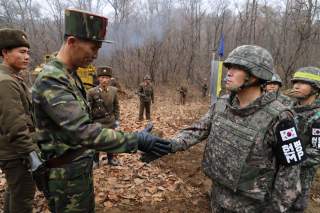The Hanoi Summit – We Asked Abigail Bard What Happens Next in U.S.-North Korea Relations
"Working-level groups create a critical space for both sides to foster this missing trust."
Editor’s Note: Looking for more opinions on where we go after the Hanoi summit? Check out all 80 expert takes on where U.S-North Korea relations go next here.
It’s time for both the United States and North Korea to empower their working-level diplomats so that the two countries can build trust and verify intentions.
While U.S. president Donald Trump and North Korean leader Kim Jong-un are unlikely to ever agree on why their talks in Hanoi broke down, the abbreviated timeframe for preparatory meetings did not help. Working-level talks between the two countries didn’t begin in earnest until the summit was announced, and U.S. special envoy for North Korea Stephen Biegun didn’t meet his North Korean counterpart until roughly a month before the summit. Regardless of whether there is a deal to be had or leader-to-leader meetings are needed to reach that deal, it is clear there hasn’t been enough support for working-level negotiations.
For North Korea, this might have been part of their strategy—Trump has demonstrated a willingness to make moves without consulting his team or allies. Why waste your time with special envoy Biegun when you could get better concessions for less effort from the President himself? On the U.S. side, it’s unclear if Trump knows or cares that his actions make it harder for the United States to get a sturdy deal with North Korea.
However, lower-level talks are necessary to iron out the little details that add up to a grand bargain. Agreeing on the definition of “peace regime” and what exactly will happen at Yongbyon will take back-and-forth. Determining the exact pacing and sequencing of sanctions relief and denuclearization requires technical experts at the table. The United States and North Korea can’t reach an agreement if they aren’t in regular communication and if both sides are skeptical (and with good reason) of each other.
Working-level groups create a critical space for both sides to foster this missing trust. By cooperating on areas of mutual interest, both sides can demonstrate commitment and credibility. The two countries could facilitate family reunions for North Koreans and Korean Americans, establish joint liaison offices, create channels for the delivery of humanitarian aid, and repatriate more remains of U.S. service members lost in the Korean War.
While none of this guarantees diplomatic success on the denuclearization front, these lines of effort and the regular communication they entail would also reduce the chances of miscalculation and misunderstanding. If Trump and Kim actually want to reach a deal, they need to give their teams the chance to get to work.
Abby Bard is a research associate for Asia policy at the Center for American Progress.
Image: Reuters

